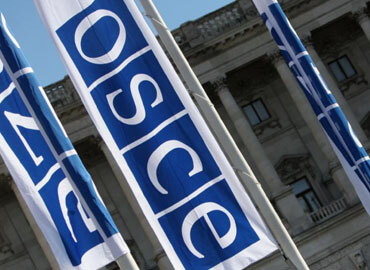Introduction: Why the world needs a Special Tribunal for Belarus
The United Nations High Commissioner for Human Rights, following the detailed and meticulous examination of human rights situation in Belarus in the run-up to the 2020 presidential election and in its aftermath, found that some of the human rights violations reported “may… amount to crimes against humanity, as defined in international customary law, when such acts are committed as part of a widespread or systematic attack against any civilian population, with knowledge of the attack.” (Situation of human rights in Belarus in the run-up to the 2020 presidential election and in its aftermath. Report of the United Nations High Commissioner for Human Rights. UN doc. A/HRC/52/68 (3 February 2023), § 54.) According to the High Commissioner, “[c]onsidered cumulatively, the organized nature of the violations renders it improbable that they were random and accidental. On the contrary, they appear to have been part of a campaign of violence and repression, intentionally directed at those who were – or were perceived to be – opposing the Government or expressing critical or independent voices.” (Ibid.)
The treatment of civilian protesters by the de facto authorities of Belarus during the presidential electoral campaign of 2020 and immediately after it led to its powerful condemnation and legal qualification as “clearly… crimes against humanity” by leading civil society actors, such as OMCT, the Geneva-based umbrella-type World Organisation against Torture. It concluded that “[the] repressions of the Lukashenka regime should be considered crimes against humanity as defined by international criminal law due to their grave nature and systematic and widespread character.”
In May 2021 a coalition of non-governmental organisations led by the International Partnership for Human Rights filed a communication with the Prosecutor of the International Criminal Court asking her “to conduct a preliminary inquiry into the situation in Belarus (and Lithuania, Latvia, Poland and Ukraine), with a view to seeking authorisation to open a full investigation into the alleged crimes [against humanity committed in Belarus]. ” (Ibid., § 178.) The authors of this communication argued that “there [was] a reasonable basis to believe that since at least June 2020, the Lukashenko regime ha[d] perpetrated the crime against humanity of deportation under Article 7(1)(d) of the [Rome] Statute and the crimes against humanity of persecution on political grounds under Article 7(1)(h) of the [Rome] Statute.” (Ibid., § 176.). In November 2021 the European Center for Constitutional and Human Rights (ECCHR) together with OMCT filed a criminal complaint with the Federal Prosecutor General of Germany “against six named, high-ranking members of the Belarusian security apparatus for crimes against humanity.”
Some of the crimes against humanity are criminalized in Belarusian domestic law. (Section 128 of the Criminal Code of the Republic of Belarus (as amended in 2023). However, the practical attitude of the Lukashenka de facto authorities is characterized by “the overall situation of impunity” (Supra note 1, § 14; see also Report on the serious threat to the OSCE human dimension in Belarus since 5 November 2020, by Professor Hervé Ascensio, Rapporteur of the OSCE Moscow Mechanism (11 May 2023), §§ 177 and 180.) in respect of the alleged perpetrators of serious human rights violations and crimes against humanity in Belarus. Lukashenka himself “praised the response of law enforcement officials to the protests”. (Supra note 1, § 58.) The Investigative Committee of the Republic of Belarus (“the Investigative Committee”) announced that “no cases of unlawful acts by the police had been identified.” (Ibid., § 58.) According to the Investigative Committee, after conducting checks of approximately 5 000 complaints of torture and ill-treatment received during the summer and autumn of 2020, it decided not to initiate any criminal cases. In its decision rendered in August 2021, a year after the start of the repression, the Investigative Committee stated: “The collected evidence, including the video recordings of the Ministry of Internal Affairs, allows us to ascertain compliance with the legal requirements of the use of physical force and special means by officers in the suppression of offences. Allegations of abuse of office, torture, sexual abuse, which have been spread by the extremist channels on Telegram, have not been confirmed.”
The prohibition of crimes against humanity is one of the peremptory norms of general international law (jus cogens) (International Law Commission. Draft conclusions on identification and legal consequences of peremptory norms of general international law (jus cogens), adopted by the Commission at its seventy-third session (2022), included into the Commission’s report to the General Assembly. UN doc. A/77/10, pp. 11-16, taken note with appreciation by the unanimously adopted United Nations General Assembly Resolution 77/103 (7 December 2022). Annex, (c), norms which “reflect and protect fundamental values of the international community” (Ibid., Conclusion 2.) and which “are universally applicable and are hierarchically superior to other rules of international law.” (Ibid.) Peremptory norms of international law (jus cogens) “give rise to obligations owed to the international community as a whole (obligations erga omnes), in relation to which all States have a legal interest. ” (Ibid., Conclusion 17 (1).
It follows that the commission of crimes against humanity in Belarus, accompanied with impunity, should lead to the appropriate reaction on the part of the international community of States which must be aimed at closing the accountability gap and ensuring effective, prompt, and fair investigation of crimes capable of leading to the efficient prosecution of alleged perpetrators, irrespective of their official status, and punishment of those responsible by a court of law, in independent, impartial, and adversarial procedure.
Given “the lack of an independent judicial system in Belarus” (OSCE Resolutions adopted at the thirtieth annual session in Vancouver (30 June – 4 July 2023), Resolution on Support for a Democratic Belarus, § 4.) and thus the absence of reasonable perspective of achieving justice domestically while the country is governed by the Lukashenka regime which is interested in shielding perpetrators and unjustly imprisoning and torturing victims, other legal avenues of obtaining redress and dispensing justice should be pursued, including the international ones.
Absent referral of the situation to the International Criminal Court (ICC) by the United Nations Security Council (which will not be possible while Lukashenka regime enjoys backing of the current leadership of the Russian Federation occupying the seat of the permanent member of the Council), crimes against humanity in Belarus mostly fall outside the ICC jurisdiction as they are committed not on the territory of the State Party to the Rome Statute and not by the nationals of the State Party. (Rome Statute of the International Criminal Court (“Rome Statute”), Article 12.) The International Criminal Court might have limited jurisdiction in respect of the crimes against humanity of persecution and deportation with respect to those Belarusians who fled the country and settled in the Member States of the European Union, mostly Poland and Lithuania, on the basis of Bangladesh/Myanmar precedent (ICC Pre-Trial Chamber III, Situation in the People’s Republic of Bangladesh / Republic of the Union of Myanmar, Decision Pursuant to Article 15 of the Rome Statute on the Authorisation of an Investigation into the Situation in the People’s Republic of Bangladesh / Republic of the Union of Myanmar, ICC-01/19-27, 14 November 2019.) There is, however, no other functioning international accountability mechanism presently in existence in respect of the situation in Belarus.
The European Parliament called on the Member States of the European Union “to actively apply the universal jurisdiction principle and prepare court cases against Belarusian officials, including Aliaksandr Lukashenka, who are responsible for, or complicit in, systematic violence and repression and crimes against humanity [against Belarusian people].” (European Parliament Resolution 2023/2573 (RSP) of 15 March 2023 on further repression against the people of Belarus, in particular the cases of Andrzej Poczobut and Ales Bialiatski, § 11.) While this call is welcomed, it is to be recognized that the potential of domestic investigations, prosecutions and criminal trials on the basis of universal, or extraterritorial, jurisdiction principle is limited, for a number of practical and legal reasons. Most importantly, Heads of States and Governments, such as Mr Lukashenka, enjoy inviolability and immunity from criminal jurisdiction in the domestic courts of foreign countries, on the basis of well-established rule of customary international law closely linked to the principle of State sovereignty, as upheld by the International Court of Justice. (International Court of Justice, Arrest Warrant of 11 April 2000 (Democratic Republic of the Congo v. Belgium), Judgment, I.C.J. Reports 2002, pp. 21-22, § 51.)
The Belarusian society is looking for accountability mechanisms in respect of the grave crimes committed by the members of the Lukashenka regime against Belarusians and others in Belarus. Sviatlana Tsikhanouskaya, leader of the Belarusian democratic forces, is strongly advocating for the establishment of the international special criminal tribunal. The political will of the States, which in the end of the day is needed for the creation of such judicial institution, is, however, lacking as of today. Various pretexts are used in the European capitals to avoid the issue. That is shameful and unacceptable.
This paper argues for the creation of a Special Tribunal for Belarus with jurisdiction to prosecute crimes against humanity committed in Belarus by the Lukashenka regime since 2020 as an international response to the systemic and widespread crimes against humanity in the heart of Europe, explores possible legal options available for the creation of this international judicial institution and discusses pros et contras of various options, proposes basic modalities of the Tribunal’s functioning and financing, and the role of the Belarusian democratic forces in its establishment.
How to do it: Legal models of the establishment of a Special Tribunal for Belarus
The classical ad hoc international criminal tribunals – for the former Yugoslavia (ICTY) and for Rwanda (ICTR) — were established by the resolutions of the United Nations Security Council acting pursuant to Chapter VII of the United Nations Charter. (United Nations Security Council Resolutions 827 (1993) and 955 (1994), respectively.) This legal route is now not possible for the establishment of the Special Tribunal for Belarus given the firm political support that the Lukashenka regime enjoys on the part of the Russian Federation.
Other legal modalities have been utilized for the establishment of the ad hoc international criminal tribunals. The Special Court for Sierra Leone, for example, was founded by an international agreement concluded between the Government of Sierra Leone and the United Nations Secretary-General, the latter acting on the basis of the United Nations Security Council resolution, but adopted without reference to Chapter VII of the Charter. (John Cerone, The Special Court for Sierra Leone: Establishing a New Approach to International Criminal Justice, in ILSA Journal of International & Comparative Law, Vol. 8 (2002), pp. 379-381.) An agreement between the United Nations and Lebanon also served as a legal basis for the establishment of the Special Tribunal for Lebanon. (Agreement between the United Nations and the Lebanese Republic on the establishment of a Special Tribunal for Lebanon, annexed to the United Nations Security Council Resolution 1757 (2007). However, these options are not feasible in the case of Belarus for the same reason: the Russian Federation will use its veto power to block the decision of the United Nations Security Council.
There are also precedents and proposals for the establishment of ad hoc international criminal tribunals on the basis of agreements of States with the international organisations other than the United Nations. Kosovo Specialist Chambers, as a relatively recent example, were established on the basis of the exchange of letters between the President of Kosovo and the European Union High Representative for Foreign Affairs and Security Policy. The Parliamentary Assembly of Council of Europe, when considering the idea of the establishment of a special tribunal in respect of the crime of aggression against Ukraine, opined “that the Council of Europe should have an active leading role in the establishment of the special tribunal.” (Parliamentary Assembly of Council of Europe Resolution 2482 (2023) “Legal and human aspects of the Russian Federation’s aggression against Ukraine”, § 6.)
The universal permissive rule for the exercise of the criminal jurisdiction by States under international law is the one established almost a century ago by the Permanent Court of International Justice, the predecessor of the International Court of Justice: “all that can be required of a State is that it should not overstep the limits which international law places upon its jurisdiction; within these limits, its title to exercise jurisdiction rests in its sovereignty.” (Permanent Court of International Justice, Judgment of 7 September 1927 in the S.S. “Lotus” case, Series A no. 10, p. 19.) In other words, States are entitled to exercise domestic jurisdiction in respect of criminal offences committed abroad in all cases, except when such exercise is expressly prohibited by international law.
The International Law Commission’s Draft Articles on Prevention and Punishment of Crimes against Humanity (“Draft Articles on Crimes against Humanity”), (International Law Commission. Draft articles on Prevention and Punishment of Crimes against Humanity, adopted by the Commission at its seventy-first session (2019), included into the Commission’s report to the General Assembly. UN doc. A/74/10, pp. 11-18, taken note with appreciation by the unanimously adopted United Nations General Assembly Resolution 77/249 (30 December 2022), which may be considered reflective of rules of customary international law in the absence of an international treaty on the subject, provide for the establishment of domestic (national) criminal jurisdiction by States over the crimes against humanity on the basis of territorial (“when the offence is committed in any territory under its jurisdiction or on board a ship or aircraft registered in that State”) (Ibid., Article 7 (1)(a), active nationality (“when the alleged offender is a national of that State”) (Ibid., Article 7 (1)(b), and passive nationality (“when the victim is a national of that State”) (Ibid., Article 7 (1)(c) principles. On top of that, the Draft Articles on Crimes against Humanity provide that each State is obliged to establish its criminal jurisdiction over the crimes against humanity “where the alleged offender is present in any territory under its jurisdiction and it does not extradite or surrender the [alleged perpetrator]” (Ibid., Article 7 (2); Article 10.) (aut dedere aut judicare principle). Even more, the Draft Articles on Crimes against Humanity expressly provide for the possibility for States to establish domestic criminal jurisdiction “in accordance with [each State’s] national law” (Ibid., Article 7 (3). Many States, including Members of the European Union, such as Lithuania, establish their domestic criminal jurisdiction over crimes against humanity on the basis of universal jurisdiction principle, or on the basis of extraterritorial application of their criminal law if, for example, the victims of crimes are present or resident on their territories.
It is to be recalled that Judges Rosalyn Higgins, Pieter Kooijmans, and Thomas Buergenthal of the International Court of Justice made the following remark in their joint separate opinion in the Arrest Warrant case: “The series of multilateral treaties with their special jurisdictional provision reflect a determination by the international community that those engaged in war crimes, hijacking, hostage taking, torture should not go unpunished. Although crimes against humanity are not yet the object of a distinct convention, a comparable international indignation at such acts is not to be doubted” (Arrest Warrant, supra note 22, Joint Separate Opinion of Judges Higgins, Kooijmans and Buergenthal, § 51).
In respect of the crimes against humanity in Belarus, some European States, such as Lithuania, have in practice started criminal proceedings on the basis of at least one of the afore-stated principles for the exercise of domestic criminal jurisdiction over the crimes against humanity. Given the jus cogens nature of the prohibition of crimes against humanity in international law, the exercise of criminal jurisdiction in this situation may be considered an international legal obligation and moral imperative of the States concerned, particularly taking into account the overall absolute impunity of perpetrators in Belarus.
Furthermore, international law provides for the possibility for States to transfer their domestic criminal jurisdiction to an international level. That was how the Allied Powers established the International Military Tribunal in Nuremberg: “they have done together what any one of them might have done singly” (International Military Tribunal, Judgment of 1 October 1946, in The Trial of German Major War Criminals. Proceedings of the International Military Tribunal sitting at Nuremberg, Part 22, p. 444.)
Those States which exercise their criminal jurisdiction over the crimes against humanity in Belarus in practice, or have domestic legal potential to do so, or contemplate establishing such potential in their national law, as they are entitled to do under the Draft Articles on Crimes against Humanity, may, through conclusion of a multilateral international treaty, transfer that jurisdiction to an ad hoc international criminal tribunal – Special Tribunal for Belarus (STB).
The treaty establishing the Special Tribunal for Belarus may include or not include the participation of an inter-governmental organisation such as, for example, the United Nations (through a General Assembly resolution authorizing the Secretary-General to sign the respective treaty on behalf of the Organisation), or the Council of Europe.
What matters above all is the enthusiastic participation of the affected States, in particular, those States on the territories of which victims of crimes against humanity committed in Belarus now reside, and those States on the territories of which the potential perpetrators may appear, first of all, European States which are neighbors of Belarus, such as Lithuania, Poland, Latvia, and Ukraine. Other European States hosting a considerable number of Belarusians who fled repression, such as Germany, Czechia, or Slovakia, may also wish to consider being part of this international institution, which in principle should remain open to all good-willing States, including those of “the global South”.
How to do it better: advantages of some of the legal models proposed
Special Tribunal for Belarus established on the basis of an international treaty will empower the international community to deal with horrendous crimes against humanity committed by the Lukashenka regime against Belarusians and others present in Belarus, to prosecute those responsible, and to try them fairly, impartially, and independently.
There are several advantages of such a model.
First, it will allow States not to duplicate their domestic prosecutions. This international tribunal will be able to take over cases from domestic investigators and prosecutors of various European jurisdictions and conduct them on behalf of all States Parties to the treaty establishing the Special Tribunal for Belarus, and, by extension, on behalf of the international community.
Second, international tribunal will be more accessible to victims. Belarusians and other victims of the Lukashenka regime will not need to explore peculiarities of domestic criminal systems of various States which may differ significantly. They will be able to submit their grievances to the international prosecutor of the Special Tribunal for Belarus in accessible and transparent manner. The Tribunal’s outreach program aimed at the Belarusian communities in exile will be much more efficient than outreach initiatives of any single country.
Third, Heads of State and Government do not enjoy immunity, under customary international law, with respect to the jurisdiction of an international court established by an international treaty, given the inapplicability in this situation of the principle of par in parem non habet imperium (“equals do not have power in respect of each other”) (ICC Appeals Chamber, Prosecutor v. Omar Hassan Ahmad Al-Bashir, Judgment in the Jordan Referral re Al-Bashir Appeal, ICC-02/05-01/09-397, 6 May 2019, §§ 113-115.)
Therefore, the Special Tribunal for Belarus will be able to conduct criminal trial of Mr Aliaksandr Lukashenka, among other alleged perpetrators.
Fourth, in terms of mutual legal assistance, such as extradition, the Special Tribunal for Belarus will be able to rely on co-operation of all States Parties to it, therefore re-doubling efforts in searching for fugitives from justice and tracking their assets.
Fifth, the Special Tribunal for Belarus will enjoy legitimacy derived from combined international standing of all States Parties. It is not necessary for a particular number of countries to join the Statute of the Tribunal in order for it to achieve particular level of international legitimacy and credibility. It is much more important for it to obtain authority and legitimacy in the eyes of Belarusian people, victims of the regime based on torture and other crimes against humanity. However, there will be nothing in the international treaty establishing the Tribunal preventing other States, including countries of the “global South”, from joining this accountability project.
Finally, the Special Tribunal for Belarus will serve as an example of a creative legal solution to the challenge of impunity for crimes against humanity, which are among the most serious crimes of concern to the international community as a whole. If the international community accepts domestic extraterritorial prosecution of the crimes against humanity, it will a fortiori applaud an international initiative having the same as its objective.
The establishment of the Special Tribunal for Belarus with the involvement, through a treaty, of an international inter-governmental organisation, such as the United Nations or the Council of Europe, as a co-founder is an option to be explored, given, in particular, the wider international support for the initiative that can be obtained through its implementation via multilateral fora.
However, achieving the resolute decisions in multilateral settings, such as obtaining the majority of votes in the United Nations General Assembly, will be significantly problematic. It would likely delay progress in this matter and might even block it altogether. It will be time-consuming to ensure the inclusion of the relevant item in the Assembly’s agenda. Certain political leverage will be required to ensure that the treaty establishing the Special Tribunal of Belarus is signed by the Secretary-General on behalf of the United Nations. In addition, the participation of the United Nations in the institutional set-up may cause unexpected budgetary consequences. Taking into account the well-known maxim that justice delayed is justice denied (European Court of Human Rights, Lisovskij v. Lithuania, Application no. 36249/14, Judgment of 2 May 2017, Dissenting Opinion of Judge Kuris, § 39.), it does not appear sensible to spend years to obtain a strong majority of votes in the United Nations General Assembly, especially when a realistic and legally sound option of establishing the Special Tribunal for Belarus by an international multilateral treaty concluded between the interested States is readily available.
Obtaining political support in the Council of Europe is considered more likely but also not without hurdles. As a rule, the decisions are taken by the Council of Europe Committee of Ministers by consensus. It is hard to predict the attitude of such Members of the Council of Europe, as Hungary and Turkey. In addition, it is unclear which added value the participation of the Council of Europe may bring, as this organisation has no experience with international criminal justice.
How it will function: scope of the jurisdiction of the Special Tribunal for Belarus
The Statute of the Special Tribunal for Belarus will be adopted by the agreement of the States Parties which will elect judges, registrar, and prosecutor of the Tribunal, and approve its budget.
Jurisdiction of the Special Tribunal for Belarus ratione materiae (subject-matter jurisdiction) will include crimes against humanity, as defined in customary international law, and codified in the Rome Statute of the International Criminal Court (in conjunction with its Elements of Crimes), and in the Draft Articles on Crimes against Humanity, which are essentially the same. In its practical judicial activities, the Special Tribunal for Belarus will make strategic use of the jurisprudence on substantive issues of international criminal law, such as construction of corpus delicti of various crimes against humanity, developed to date by the International Criminal Court and ad hoc international criminal tribunals, such as ICTY and ICTR. The Appeals Chamber of the International Criminal Court has confirmed that “the crimes under the [Rome] Statute were intended to be generally representative of the state of customary international law when the Statute was drafted” (ICC Appeals Chamber, Prosecutor v. Ali Muhammad Ali Abd-al-Rahman (“Ali Kushayb”), Judgment on the appeal of Mr Abd-al-Rahman against the Pre-Trial Chamber II’s “Decision on the Defence’s ‘Exception d’incompétence’ (ICC-02/05-01/20-302)”, ICC-02/05-01/20-503, 1 November 2021, § 89.) therefore, the rule of nullum crimen sine lege (“crime should be established by law”) is respected retroactively.
Jurisdiction of the Special Tribunal for Belarus ratione temporis (temporal jurisdiction) will cover the time-period starting at some point in late spring or early summer 2020, when the presidential electoral campaign started, accompanied by arrests of opposition candidates and violent dispersal of public events in their support, which eventually led to the rigged presidential election and mass protests, which triggered the brutal response on the part of the regime, and ending with the fall of Lukashenka.
Jurisdiction of the Special Tribunal for Belarus ratione loci (territorial jurisdiction) will include the territory of the Republic of Belarus. Jurisdiction of the Tribunal ratione personae (personal jurisdiction) will include nationals of the Republic of Belarus, foreign nationals, and stateless persons.
In terms of fair-trial rights of the accused, the procedural activities of the Special Tribunal for Belarus will be inspired by the high human rights standards flowing from the International Covenant on Civil and Political Rights, as interpreted by the Human Rights Committee, and the European Convention for the Protection of Human Rights and Fundamental Freedoms, as interpreted by the European Court of Human Rights.
The procedure before the Special Tribunal for Belarus will include the participation of victims, through their legal representatives, in the court proceedings. There will be arrangements for the compensation and rehabilitation of victims, including, in particular, the dispensation of assets belonging to perpetrators currently frozen in the European Union and elsewhere.
The rules of procedure of the Special Tribunal for Belarus will be inspired by the rules of procedure and evidence of the International Criminal Court and ad hoc international criminal tribunals. There will be an opportunity, however, for trials in absentia, using the Special Tribunal for Lebanon as a model, with the requirement based on international human rights law, that if the person convicted in absentia appears before the Tribunal, he or she is entitled to a retrial.
The judges, prosecutor, and members of staff of the Special Tribunal for Belarus, as well as legal professionals practicing before the Tribunal as defense counsel and victims’ legal representatives will comprise legal experts from the States Parties, and Belarusian and other independent lawyers.
How much will it cost: expenses and budgetary implications
Critics of the project of international criminal justice very often refer to the high costs associated with the establishment of international criminal tribunals.
There are three answers to this critique: first, international criminal tribunals try those who are not tried domestically thus saving resources of national budgets; second, there are practical approaches aiming at managing the associated costs; third, there are creative modes of funding of the project to be used for the Special Tribunal for Belarus.
It is proposed that the Special Tribunal for Belarus is based in Vilnius, Lithuania. It will allow to manage costs associated with housing and personnel of the Tribunal in comparison with The Hague, and will make the Tribunal close to the affected communities of Belarusians in exile.
It is also proposed that the Special Tribunal for Belarus has one working language – English – which will seriously limit costs of translation and interpretation during the court proceedings. Core legal texts and most important rulings of the Tribunal should be translated into Belarusian language.
Apart from contributions of States Parties, the Special Tribunal for Belarus will be able to draw from private sources of funding, including donations of Belarusians and their foundations.
The judgments of the Tribunal will serve as a legal ground for expropriation of assets of the defendants located within the States Parties to the Tribunal, and elsewhere, and their subsequent use for the benefit of victims and the financing of the Tribunal itself.
Who will lead it: Forms of involvement of the Belarusian democratic forces in accountability efforts
Belarusian democratic forces will be the central driving force behind the campaign for the establishment of the Special Tribunal for Belarus, and its ultimate success. It is important that the States Parties when establishing the Tribunal through an international treaty and drafting its statute and rules of procedure are eager to take account of the views and concerns of the Belarusian democratic forces and civil society groups. It is advisable that the formal representation of the Belarusian democratic forces takes part in the creation of the Tribunal as a central element of the overall project, in particular, through the meaningful participation of the Belarusian professional international lawyers in drafting the statute and internal rules of the Tribunal, selection of its prosecutor, judges, and leading staff members.
Contribution of the Belarusian legal community to the project of the Tribunal will be indispensable. Evidence of crimes collected by the Belarusian civil society groups may be used by the Tribunal. In particular, the collection gathered by the International Accountability Platform for Belarus (IAPB) will be a great asset.
Belarusian independent human rights lawyers will serve in the prosecutor’s office, as judges of the Tribunal, as defense counsel, and legal representatives of victims. International lawyers are very important, but the key for the Tribunal’s success is that it will be seen as 1) a Belarusian institution with international expertise, serving Belarusian interests, with Belarusian people as its key beneficiary; and 2) important contribution to the struggle of humanity against gravest crimes of international concern.
Conclusion
It is high time to translate the promises of international accountability for the crimes against humanity committed in Belarus into concrete action on the part of the international community of States. Moving from solemn statements and well-intentioned resolutions about the need to ensure accountability in Belarus to practical solutions leading to the development of an effective and efficient, functioning international judicial mechanism would demonstrate that the concerned States really mean what they say. “By their fruits you will know them” (Gospel of Matthew 7:16).
Belarusians, who collectively chose the European path for themselves and their country in 2020, fought for their future, their ideals, and their dreams consistently, peacefully, and courageously, risking their freedom, health and ultimately their lives for this cause, deserve nothing less than accountability in action. The Special Tribunal for Belarus, as outlined in this policy paper, will be an international judicial institution capable of fulfilling those promises and achieving justice for Belarusians who survived torture, persecution, and other crimes against humanity. Without justice sustainable peace is unimaginable.











